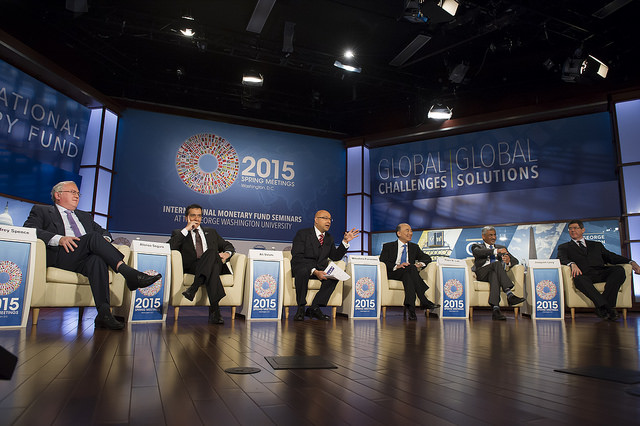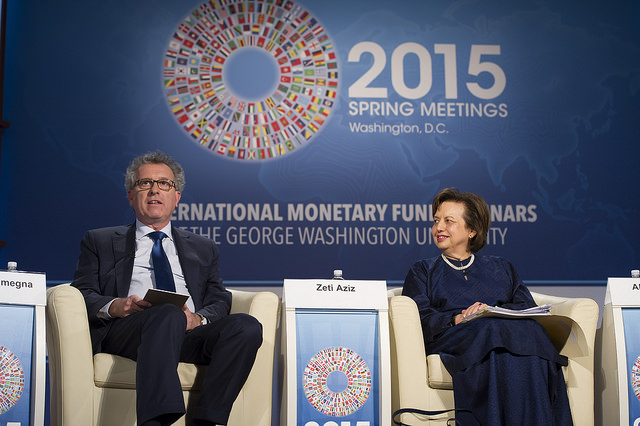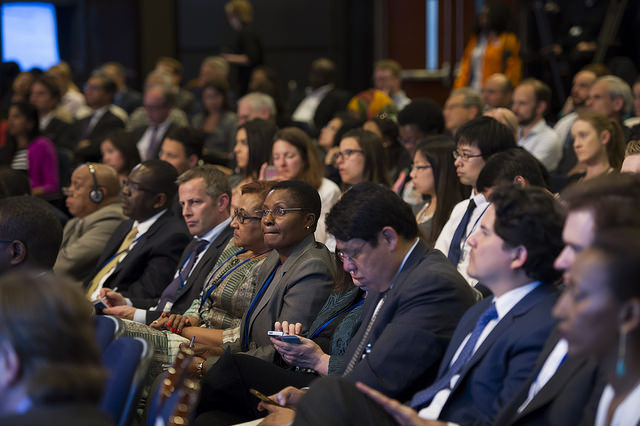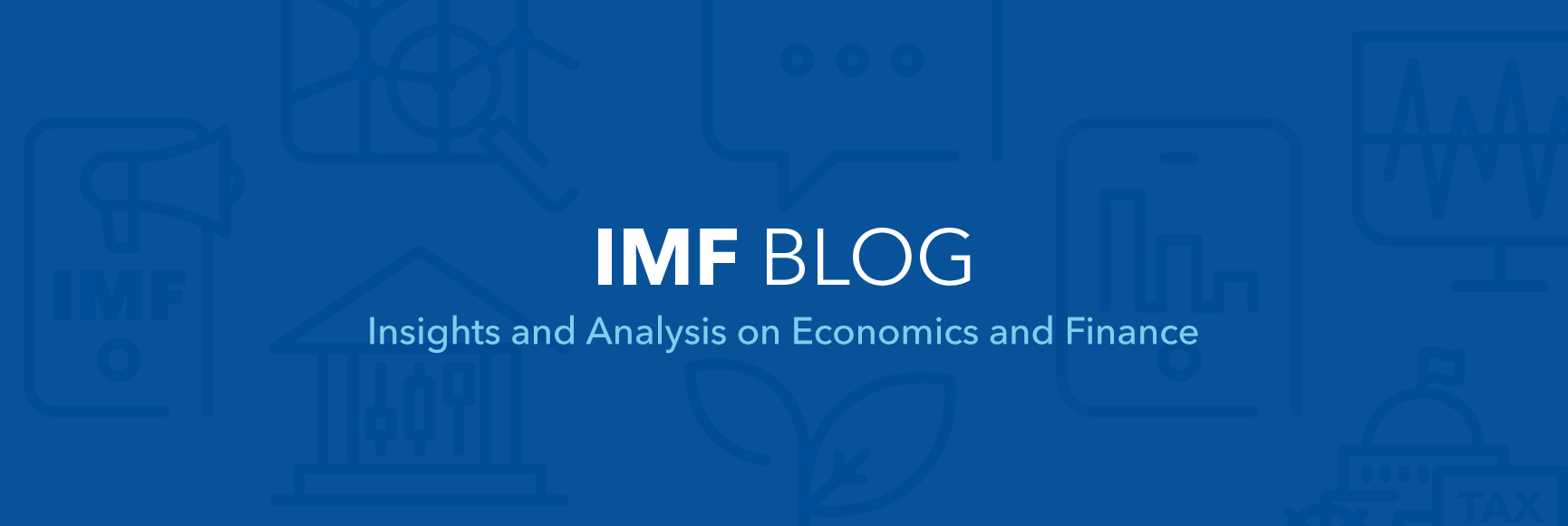All happy countries are alike; each unhappy country is unhappy in its own way.
This twist on Tolstoy’s Anna Karenina echoed through the seminars during the IMF’s Spring Meetings as most countries, while recovering, are struggling with the prospect of lower potential growth and the “new mediocre” becoming a “new reality.”
Our editors fanned out to cover what officials and civil society had to say about how to help countries pave their own path to happiness.
[caption id="attachment_9394" align="alignright" width="250"] Moderator Ali Velshi (center) of Al Jazeera America leads a panel discussion on The Why, Where & How of Infrastructure Investment during the 2015 IMF Spring Meetings IMF Photo/Ryan Rayburn[/caption]
Moderator Ali Velshi (center) of Al Jazeera America leads a panel discussion on The Why, Where & How of Infrastructure Investment during the 2015 IMF Spring Meetings IMF Photo/Ryan Rayburn[/caption]
Even economists know money can’t buy happiness, but it can buy bridges and roads. Spending on infrastructure is good for jobs now and growth in the future. But who pays and what works for each country varies.
“Money is only part of the problem. Implementing something that makes sense is a huge problem,” said Rajiv B. Lall of India’s Infrastructure Development Finance Company.
A combination of public and private money is a popular solution.
“Most of our infrastructure projects have had participation from the private sector,” said Joaquim Vieira Ferreira Levy, Finance Minister of Brazil. “We need to differentiate infrastructure investments with markets returns, and those with social returns like public housing.”
“In Peru, we are increasingly using public-private partnerships for infrastructure projects because of their medium term benefits,” said Alonso Segura, Peru’s finance minister. “If you only rely on public procurement, you will move very slowly.”
We’ve also covered two hot-topic seminars in more detail: what to do about slower growth in Asia, and low inflation.
Ever since bankers lit a match under the global economy, how to get the financial system to help the economy has been widely debated, with a spotlight on Islamic finance.
[caption id="attachment_9393" align="alignright" width="250"] Pierre Gramegna(left), Minister of Finance for Luxembourg, speaks along with Zeti Akhtar Aziz, Governor, Bank Negara Malaysia at the seminar Islamic Finance: Unlocking its Potential & Supporting Stability as part of the 2015 IMF Spring Meetings in Washington, D.C. IMF Photo/Ryan Rayburn[/caption]
Pierre Gramegna(left), Minister of Finance for Luxembourg, speaks along with Zeti Akhtar Aziz, Governor, Bank Negara Malaysia at the seminar Islamic Finance: Unlocking its Potential & Supporting Stability as part of the 2015 IMF Spring Meetings in Washington, D.C. IMF Photo/Ryan Rayburn[/caption]
“Islamic finance has no disconnect between finance and [a country’s] real economy,” said Zeti Akhtar Aziz, Governor of the Central Bank of Malaysia.
It also turns out that one way to finance infrastructure is through Islamic finance, since—similar to public-private partnerships—investors finance the construction of roads, bridges, and similar projects, and receive the returns on these investments until the project reaches maturity.
While Islamic finance is growing rapidly in Muslim countries, it is also attracting attention in other places. Pierre Gramegna, Luxembourg’s finance ministers said his country recently issued the first government Sukuk—an Islamic bond—denominated in Euros.
“We wanted to diversify our activities and to innovate,” he said.
Gramegna isn’t alone. Hong Kong SAR, South Africa, and the United Kingdom have also issued Sukuk and the world-wide market for these bonds has increased twentyfold for over a decade to reach $119.7 billion in 2013.
We also covered recent economic developments in the Middle East and North Africa.
How some of the world’s most vulnerable countries, often called “fragile,” fare is another matter.
“By 2030, we forecast an average growth of 6 percent for about 55 countries,” said Jakkie Cilliers from the Institute for Security Studies based in South Africa. “But despite Africa’s sterling growth trajectory, about 10 of the continent’s countries will be trapped in syndrome of fragility.”
Leaving behind a fragile past is about much more than just economic growth.
“Building a national consensus and ensuring that all groups are represented in an inclusive political arrangement embedded in the constitution is the first step in the way out of fragility,” said Rwanda's Finance Minister Claver Gatete.
An African parliamentarian in the audience captured the urgency of the needs in many fragile states.
“If you offer someone in a fragile state $10 today versus $100 at the month’s end, he will take the $10. Why? Because he doesn’t know if he’ll survive.”
If you care about growth and you’re not looking at trade, you’re missing the boat. But how should countries rethink the role of trade?
[caption id="attachment_9392" align="alignright" width="250"] Arvind Subramanian, Chief Economic Advisor to the Indian Government, speaks during the seminar The New Global Trade Landscape: Challenges and Opportunities during the 2015 IMF Spring Meetings in Washington, D.C. IMF Photo/Ryan Rayburn[/caption]
Arvind Subramanian, Chief Economic Advisor to the Indian Government, speaks during the seminar The New Global Trade Landscape: Challenges and Opportunities during the 2015 IMF Spring Meetings in Washington, D.C. IMF Photo/Ryan Rayburn[/caption]
“Trade is moving from stuff to fluff,” said Arvind Subramanian, Chief Economic Advisor to the Government of India. “Services are becoming much more important.”
But negotiating a deal on trade in services is no easy feat.
“70 percent of what goes into making a loaf of bread is services, yet it’s the most difficult part to agree,” said Mari Elka Pangestu, a former Indonesian Minister of Trade and currently professor of economics at the University of Indonesia.
Commodities, climate change, and public debt
The recent slump in commodity prices, particularly oil, creates winners and losers.
Ngozi Okonjo-Iweala, Finance Minister of Nigeria, said that while her country is vulnerable to falling oil prices, it is an opportunity to diversify the economic base away from oil and implement structural reforms to improve the country’s prospects.
“Instead of moaning we should see this as a good opportunity to really make those tough choices,”she said.
Lower commodity prices can also allow countries to cut fuel subsidies and contribute to fighting climate change.
Carbon pricing can also be an opportunity to reduce high public debt, said David Wessel of the Brookings Institution in Washington, D.C. and contributing correspondent, The Wall Street Journal. When it comes to public debt, countries neglect their past at their own peril.
“If this crisis tells us anything, it’s that we should keep the memory of how difficult it is to adjust, which would have been much easier in other circumstances,” said Maria Luís Albuquerque, Portugal’s Finance Minister.
[caption id="attachment_9391" align="alignright" width="250"] A full house during the seminar Financing for Development: The Way Forward during the 2015 IMF Spring Meetings in Washington, D.C. IMF Photo/Ryan Rayburn[/caption]
A full house during the seminar Financing for Development: The Way Forward during the 2015 IMF Spring Meetings in Washington, D.C. IMF Photo/Ryan Rayburn[/caption]
The path to economic growth for developing countries is paved with 17 goals and 169 targets.
2015 is the year of the Sustainable Development Goals, created to replace the Millennium Development Goals. Here’s our more detailed coverage about how to finance development.
Big ambitions require big bucks, and Jeffrey Sachs, director of the Earth Institute at Columbia University in New York has an idea.
“There are 1,800 billionaires in the world who are worth $7.1 trillion,” said Sachs. ”We have their names, we know where they live, and I have a lot of their emails. Let’s give them a call.”
Reporting by: Maureen Burke, Jacqueline Deslauriers, Bruce Edwards, Lika Gueye, Claire Lazarus, and Carmen Rollins.

